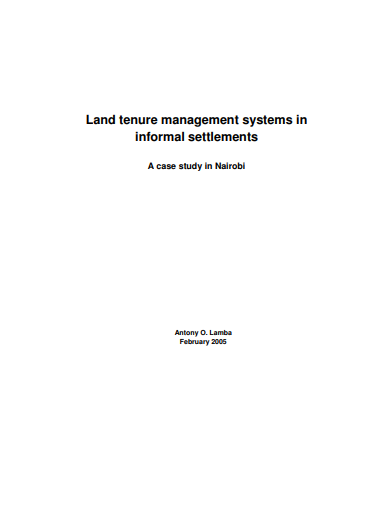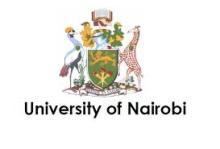Resource information
Formal land administration systems in developing countries have failed to cope with the wide range of land rights that have evolved under non-formal land tenure arrangements. Urban informal settlements in particular pose a challenge to existing land administration infrastructure in these countries. The tenure types, land rights and spatial units found in such settlements are inconsistent with the provisions of existing land law. Conventional land administration approaches can not work in these settlements. The settlements are left out of the urban development planning process as no land information is officially collected in them. This neglect often leads to low security of land tenure and poor living conditions due to lack of basic urban infrastructure and services.
Spatial and tenure regularisation in urban informal settlements is a topic of increasing significance in cities in developing countries. Lessons learnt so far show that the process of regularisation relies on the availability of reliable land information. Both spatial (land/structure type, location, size, identity, density, pattern, etc) and attribute (land/structure ownership, occupation, etc) information in informal settlements are important to the success of regularisation programmes. These lessons also indicate that it is important for the regularisation process to build on the land tenure arrangements that exist on the ground, to forge links between local tenure rules and statutory land regulations and to develop innovative land administration tools that fit the realities in these settlements.
This research investigates the land administration tools that are used to regulate land tenure systems in informal settlements in the city of Nairobi. First, a city-wide survey was conducted using a questionnaire to get an insight into the current situation of the informal land development sector in Nairobi. A settlement level case study was then carried out. The case study investigated the tools (actors, rules and procedures) used in the collection, maintenance and use of land information in three selected informal settlements. The final part of the research involved the development of a framework for assessment of the performance of land tenure management systems in informal settlements. The case study findings are used to test the assessment framework by using a scoring method.
Some of the main findings of the research are: informal land tenure systems are acceptable and legitimate for the needs of informal settlement residents; land ownership records in informal settlements are accurate, up-to-date and complete; unconventional procedures for land administration are used to meet the immediate shelter needs in the settlements; local expertise is lacking in cases where technical procedures need to be upgraded; informal land tenure management systems seem to perform better where a regularisation process is ongoing.
Formal land administration systems in developing countries have failed to cope with the wide range of land rights that have evolved under non-formal land tenure arrangements. Urban informal settlements in particular pose a challenge to existing land administration infrastructure in these countries. The tenure types, land rights and spatial units found in such settlements are inconsistent with the provisions of existing land law. Conventional land administration approaches can not work in these settlements. The settlements are left out of the urban development planning process as no land information is officially collected in them. This neglect often leads to low security of land tenure and poor living conditions due to lack of basic urban infrastructure and services.
Spatial and tenure regularisation in urban informal settlements is a topic of increasing significance in cities in developing countries. Lessons learnt so far show that the process of regularisation relies on the availability of reliable land information. Both spatial (land/structure type, location, size, identity, density, pattern, etc) and attribute (land/structure ownership, occupation, etc) information in informal settlements are important to the success of regularisation programmes. These lessons also indicate that it is important for the regularisation process to build on the land tenure arrangements that exist on the ground, to forge links between local tenure rules and statutory land regulations and to develop innovative land administration tools that fit the realities in these settlements.
This research investigates the land administration tools that are used to regulate land tenure systems in informal settlements in the city of Nairobi. First, a city-wide survey was conducted using a questionnaire to get an insight into the current situation of the informal land development sector in Nairobi. A settlement level case study was then carried out. The case study investigated the tools (actors, rules and procedures) used in the collection, maintenance and use of land information in three selected informal settlements. The final part of the research involved the development of a framework for assessment of the performance of land tenure management systems in informal settlements. The case study findings are used to test the assessment framework by using a scoring method.
Some of the main findings of the research are: informal land tenure systems are acceptable and legitimate for the needs of informal settlement residents; land ownership records in informal settlements are accurate, up-to-date and complete; unconventional procedures for land administration are used to meet the immediate shelter needs in the settlements; local expertise is lacking in cases where technical procedures need to be upgraded; informal land tenure management systems seem to perform better where a regularisation process is ongoing.


